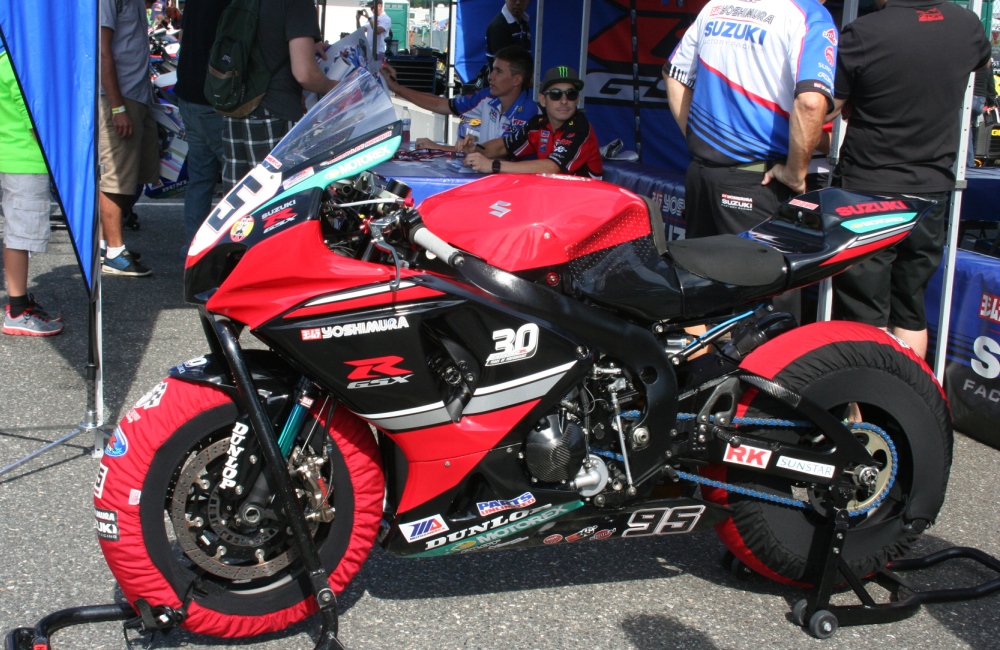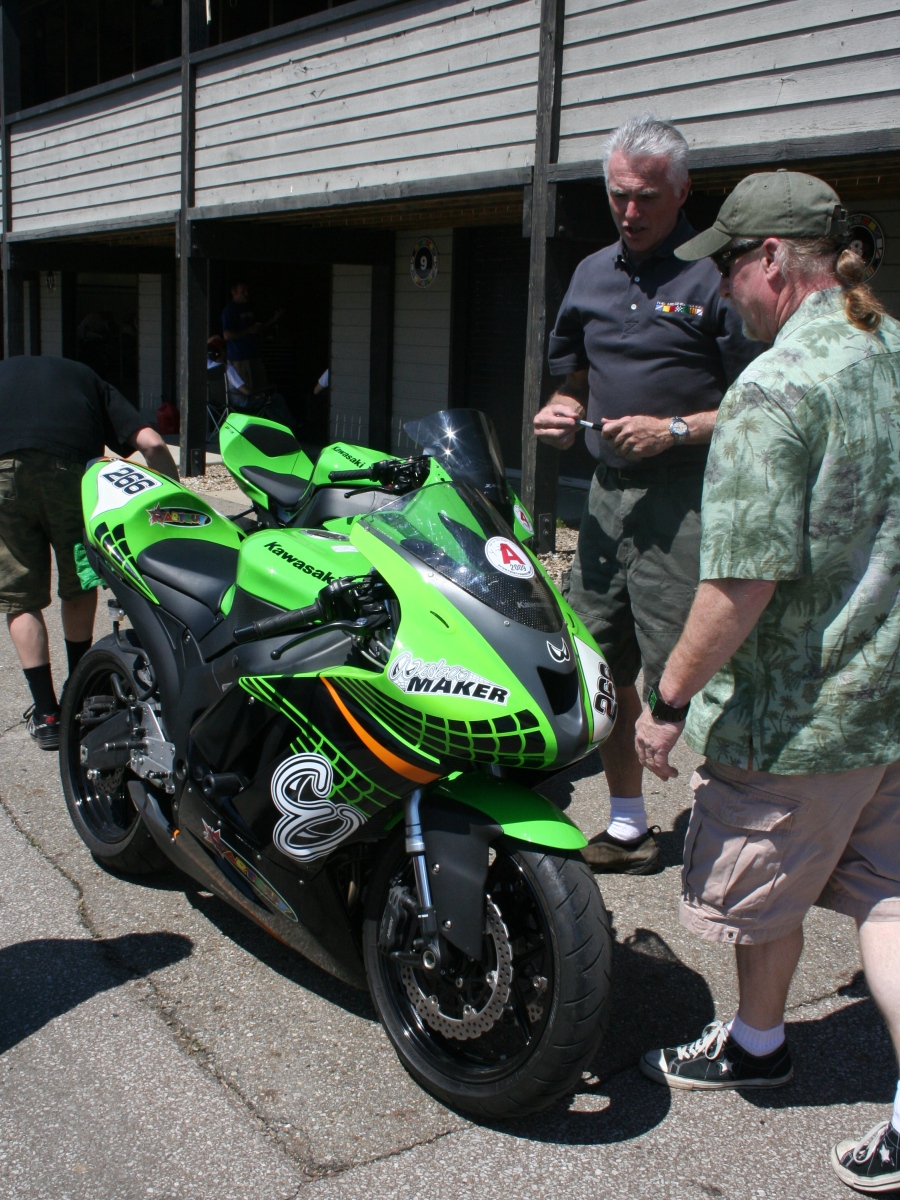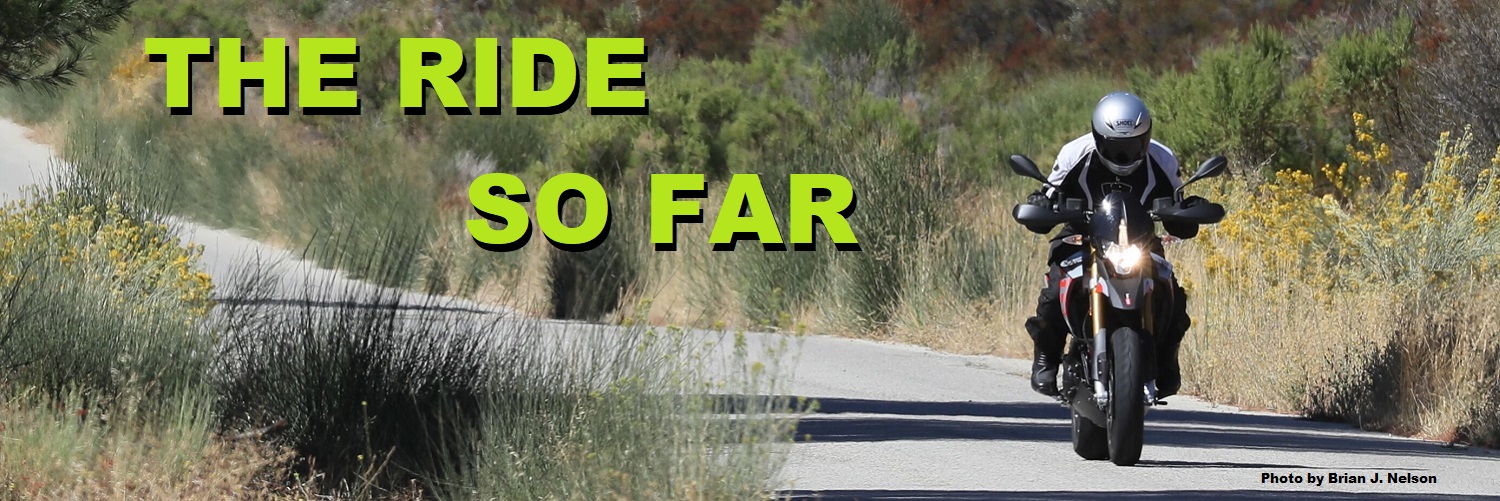The U.S. Environmental Protection Agency thinks motorcycles raced in the MotoAmerica series, the top professional motorcycle racing series in the United States, are illegal. Superbikes, Superstock bikes, Supersport race bikes — all of ’em, illegal.

The EPA says Roger Hayden’s Suzuki GSX-R1000-based superbike is illegal, just like all the other bikes raced in the MotoAmerica series.
Same goes for that modified Mazda Miata your friend races in SCCA, by the way.
If you have a track-only bike you take to track days and you’ve modified the exhaust, airbox or reflashed the ECU, the EPA says that’s illegal, too, even if it never rolls a tire onto a public street or highway.
All those companies like Dynojet and Bazzaz selling fuel-mapping hardware or companies selling full “race” exhaust systems? They might as well shut down. Selling that stuff is illegal, too.
What’s this all about? Deeply buried in documents released months ago by the EPA are provisions that explicitly contradict a decades-old understanding: that emissions regulations don’t apply to motor vehicles that are not operated on the public roads. Now, the EPA says that was never the case. All along it has been illegal to modify an emissions-certified car or motorcycle for competition use. And by the way, the fine is $37,500.
If the EPA put some teeth behind that statement, it could wipe out most grassroots car and motorcycle racing, as well as the entire MotoAmerica series and would put numerous aftermarket companies out of business. Despite how widespread the impact could be, the EPA’s comments are hidden deep in 629 pages of documents that are mostly about regulations for trucks and truck engines. Probably nobody would have noticed if not for a news release by the Specialty Equipment Market Association (SEMA), the trade association for car and truck businesses that is best known to the general public for the big trade show it presents each year in Las Vegas. Recognizing the threat to its members, SEMA came out swinging.
“This proposed regulation represents overreaching by the agency, runs contrary to the law and defies decades of racing activity where EPA has acknowledged and allowed conversion of vehicles,” said SEMA President and CEO Chris Kersting in a news release. “Congress did not intend the original Clean Air Act to extend to vehicles modified for racing and has re-enforced that intent on more than one occasion.”
SEMA, naturally, is worried about race cars, but because the EPA refers simply to motor vehicles that are emissions-certified for on-road use, motorcycles would also be affected. Here’s the language from page 391 of the 629-page EPA document (you can download the full 629-page document here):
“Also, if a motor vehicle is covered by a certificate of conformity at any point, there is no exemption from the tampering and defeat-device prohibitions that would allow for converting the engine or vehicle for competition use. There is no prohibition against actual use of certified motor vehicles or motor vehicle engines for competition purposes; however, it is not permissible to remove a motor vehicle or motor vehicle engine from its certified configuration regardless of the purpose for doing so.”
In case you’re thinking this is just some kind of mistake, and the EPA isn’t really overturning decades of accepted practice, let me add that the language is repeated elsewhere in the document and is consistent, such as on page 429, where it is stated that “Certified motor vehicles and motor vehicle engines and their emission control devices must remain in their certified configuration even if they are used solely for competition or if they become nonroad vehicles or engines…” The EPA document also asserts that this is nothing new, but rather an attempt to “clarify” existing law.

That sport bike you modified for track-only use? The EPA says it’s illegal, too. It has to meet all emissions standards, even if you don’t use it on the public roads.
A writer at Autoblog got a response from an EPA spokeswoman who confirmed that it is the EPA’s view that modifying emissions-certified street vehicles for racing has always been illegal, and this is not a new regulation.
Since motocross and Supercross bikes are not emissions-certified, they would not be affected. MotoGP bikes, as prototype race bikes, would not be affected. But any race bike that is a modified street-legal production motorcycle would be unable to race in the United States, whether it’s Cameron Beaubier’s Yamaha YZF-R1, Roger Hayden’s GSX-R1000 or, when the Superbike World Championship comes to Mazda Raceway Laguna Seca, Jonathan Rea’s Kawasaki ZX-10R and the rest of the field. The legal alternative would be to go back to racing something like 250cc two-strokes that were never certified for street use or else racing motorcycles with completely stock engines and exhaust systems.
If the EPA enforced this position, how many aftermarket companies would be out of business? Why do you see the “for closed-course competition use only” disclaimer on so many products, from exhausts to Power Commanders? Because that is the loophole that allows sales of these products. It’s already illegal to modify emissions systems on street-going vehicles, but companies sell their products with the (wink wink) “competition only” advisory. If customers then use the products on street motorcycles, the manufacturers can shrug and say it’s not their fault. But if it’s illegal to use those products on the street, on the track, or in competition, then there’s instantly no legal market.
Is anyone taking this seriously or doing anything about it? I’ve asked MotoAmerica officials for their perspective on the issue, and if they come back with a response, I’ll write an update. The American Motorcyclist Association said in a tweet “we’re looking into the issue.” Meanwhile, SEMA noted that there’s a petition at whitehouse.gov to oppose the EPA’s position.

Update: Several members of Congress have introduced HR4715, also known as the Recognizing the Protection of Motorsports Act of 2016 (RPM Act). The bill, which goes to the House Energy and Commerce Committee, explicitly states that it is not the intent of Congress for competition-only motor vehicles to be covered under the emissions regulations of the Clean Air Act. If this bill is passed, it would presumably resolve the issue I wrote about above.
Hope™ and Change™. No way should motorcyclists ever vote Democrat.